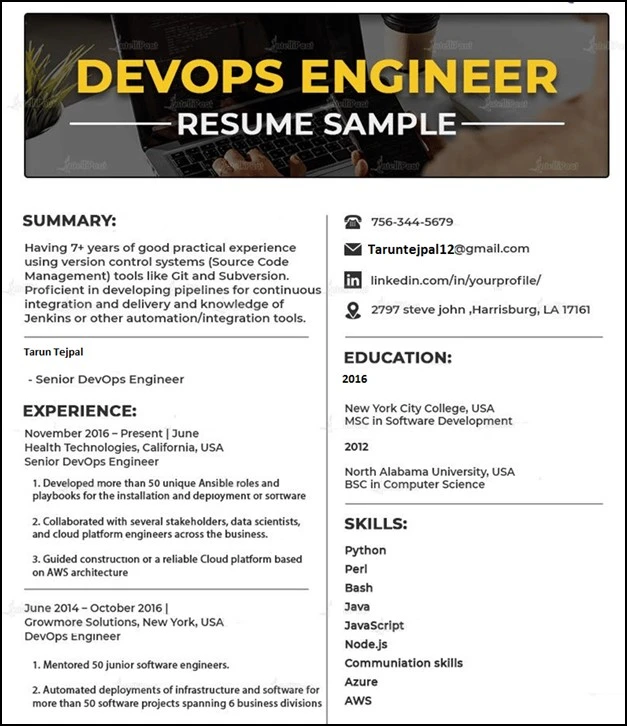A DevOps engineer applies processes, methodologies, and tools to balance needs throughout the software development life cycle, from coding and deployment to updates and maintenance. So, a DevOps engineer resume has to be intriguing enough to steer any recruiter’s attention to get hired. The global DevOps market size was estimated at 5935 million dollars in 2021. The figure is expected to increase at a compound CAGR rate of 24% and reach 22199.4 million dollars in 2027.
The demand for DevOps professionals is increasing rapidly all over the world. With more and more IT companies employing DevOps processes, the trend does not seem to ease anytime soon. According to experts, the sector is expected to generate employment in other related fields too. As such, more and more IT aspirants are testing their luck in this lucrative and evolving field.
So, how to become a DevOps engineer? Thinking about a remunerative and challenging position is one thing. Becoming a successful professional in that field is a different story. Let us find out what DevOps engineers do and how to make a compelling resume to get hired by potential employers.
What Does a DevOps Engineer Do?
DevOps engineers minimize the complexity, closing the gap between actions needed to change an application quickly, and the tasks to maintain its reliability.
IT operations teams and development teams have varying skills and different goals. Developers aim to introduce new features into an application, whereas operations teams wish to preserve the stability of the application after its release.
DevOps is about the automation and unification of processes, and DevOps engineers combine code, maintain, and manage applications. All these tasks depend on understanding not only development’s life cycles but also DevOps culture, and its practices, philosophy, and tools.
Within an agile environment, programmers, developers, and system administrators can be siloed, working on the same application without sharing necessary information to ensure value to the user.
Some companies may hire experts to “perform DevOps” within their workflows. However, successful DevOps adoption depends on changes to the process and culture. So, the practice of outsourcing only deepens the disconnection between operational teams and developers.
DevOps Engineer Job Description
DevOps Engineers are an integral part of the software development project team. They oversee the smooth completion of the entire software development process.
- They make sure that the code is correct and runs efficiently before its release to the production server.
- They have to perform integrations requested by customers.
- DevOps Engineers are required to deploy updates and new features.
- They manage the customers and the stakeholders simultaneously.
Now that you are aware of a DevOps Engineer’s job responsibilities, it is time to look at important tips to help you build an excellent resume.
How to Build an Outstanding DevOps Engineer Resume?
In today’s world, where thousands of competitors are applying and battling for the same DevOps role, how do you catch the eye of the recruiter?
By having a stellar resume that demonstrates your skills!
Here are a few tricks and tips to help you level up your game.
Customize your junior DevOps engineer resume for the position you’re applying for by considering the work profile. Not personalizing your CV is one of the most common blunders job seekers make while creating one. A suitable resume incorporates the necessary details and is framed to cater to the job application’s requirements.
For Example:
If you are looking for a position in software engineering, mention the programming languages you know and the corresponding projects that you have worked on. Although it is good to list out that digital marketing gig you did one time, keep that information limited and let your experience in the field of software engineering, the real hero, shine.
Keep it concise, crisp, and apt – A recruiter finds a CV that is to the point and succinct, very enticing. Avoid unnecessary information and get to the facts and figures. Hiring managers catch such resumes.
Add keywords- including keywords that are suitable to the job posting can be helpful if the junior DevOps engineer resume is digitally filtered and scanned.
Follow the right format- The resume’s structure is the first thing that an employer notices. So, it is the most important part. Ensure you adhere to the correct format. Use a font style and size that is not too informal and is suitable according to the recent resume trends in the market.
It is advisable to make your resume look unique and different. However, when you are trying to make it look attractive and special, make sure to follow the right format and pattern as well.
Include relevant information- Your resume must incorporate all the essential details from your educational background and contact details to your experience and skills. Remember, use a resume to promote yourself and prove to the employer that you are a perfect fit for the job.
You have seen how useful tricks and tips can make a DevOps engineer roles and responsibilities resume unique.
Now, let us discuss points that have to be followed and included in your resume.
What Should Be Incorporated in a DevOps Engineer Resume?
An ideal entry-level DevOps engineer resume for fresher must include sections such as:
- Objective or resume headline
- Contact information
- Summary
- Education
- Skills section
- Professional experience
- Relevant DevOps projects (if applicable)
- DevOps Certifications (if applicable)
DevOps Engineer Resume Headline
Ideally, a resume headline is a short, one-line statement showcasing your value proposition as a DevOps engineer. A suitable resume headline should be compelling, engaging, and informative. It must be specific to your skills, experience, and achievements.
Examples of informative and engaging DevOps engineer resume headlines include:
“Expert in managing and scaling containerized environments using Kubernetes.”
“DevOps engineer with 3 years of experience in deploying CD/CI pipelines.”
“Expert in deployment and automation of cloud infrastructure.”
Resume Summary For a DevOps Engineer
Your resume summary must be a concise, 3-4 sentence description of your professional background, career goals, and key achievements. This section must be customized to each job application, demonstrating your most relevant skills and experience for the position that you are applying for.
Examples of summaries for a DevOps engineer resume include:
- “Seasoned DevOps engineer with vast experience in implementing agile methodologies for product development. Experienced in configuration management, automation, and deployment of large-scale web-based systems”
- “DevOps engineer with over ten years of experience in designing, implementing, deploying, and managing complex infrastructures. Expert in multiple DevOps techniques and tools and knowledgeable in configuration management and infrastructure automation
- “Highly-experienced DevOps engineer with experience in using Google Cloud infrastructure, AWS, and Azure services! Proven ability in communicating and collaborating with diverse teams and managing DevOps initiatives”.
Best Skills to Include In your DevOps CV
A successful DevOps engineer must possess soft and technical skills to excel in this evolving field. Examples of technical skills to include in a DevOps engineer resume sample:
- AWS, Google Cloud Platform (GCP), Azure
- Orchestration and automation tools such as Puppet, Jenkins, and Ansible
- Continuous integration and Continuous deployment (CI/CD) pipelines
- Monitoring tools such as Datadog, Nagios, and NewRelic
- Containerization tools such as Kubernetes and Docker
- Emerging technologies for DevOps (AI)
Although DevOps engineers do not face customers, soft skills are still necessary for this group because they often collaborate with stakeholders and internal teams on projects. Make sure to integrate any soft skills that showcase your ability to collaborate, communicate, and be a team player. Examples of soft skills include:
- Attention to detail
- Excellent communication skills
- Collaboration and teamwork
- Continuous learning and self-growth
- Problem-solving skills
Professional Experience
State your work experience starting with your most recent position. Include the dates of employment, company name, job title, and a brief description of your roles/responsibilities. Highlight your achievements and focus on your contribution to the success of your project or team.
Your Role in the Company and Project
Describe your roles and contributions clearly within each project you have worked on. This will help employers understand the scope of your working experience and the value that you can bring to their company.
Education
List your educational background, starting with the most recent certification or degree. Include the institution’s name, certification or degree earned, and dates attended.
Training Certificates and Courses
Mention any relevant DevOps training certifications or courses you have completed, such as Jenkins certification or AWS Certified DevOps Engineer degree. This exhibits your commitment to continuous learning and staying updated with industry trends of DevOps. This is a specific area that can make you stand out in the competition. So, pay attention to those different industry certifications that make you unique.
Professional Affiliations
Mention any professional associations or organizations that you are part of in your DevOps engineer resume. This will demonstrate your commitment to your industry and professional knowledge. Plus, it can open doors to networking opportunities with other experts in the field.

Along with an attention-grabbing resume, you must be prepared and keep yourself updated with your concepts for the interview.
Bonus: “In addition, check out our articles of AWS DevOps Interview questions and Azure DevOps interview questions, which can be highly beneficial to crack devops interview!”
Skills Sets of DevOps Engineer
DevOps Engineers must have a perfect mix of management and technical skills. They are mainly responsible for connecting the operations and development teams. DevOps Engineers employ automation and specific tools to ensure the success of the complete software development lifecycle. The following are some of the necessary skills required by DevOps Engineers and must be mentioned on the resume. Communication and Collaboration skills, like in any other field, are necessary for a DevOps Engineer.
- They must know CD (Continuous Delivery).
- DevOps Engineers should be fluent in various programming languages such as Python, Perl, JavaScript, Bash, Java, and Node.js.
- They must be comfortable with Linux infrastructure.
- Knowledge of Agile concepts is necessary for a DevOps professional.
- Automation is the core of DevOps. So, DevOps Engineers must be able to understand and undertake various activities such as CD/CI cycles and monitoring of infrastructure using automation tools during the development process.
- A good DevOps Engineer should have strong knowledge of Cloud Computing and Amazon Web Services (AWS) services.
- DevOps engineers must be well-versed with container-related tools such as Kubernetes, Docker, and LXC.
In addition to this, DevOps Engineers should be proficient in testing as well as troubleshooting. Adding these tips and skills to your resume can boost your likelihood of landing your dream job.
Key Considerations
While a recruiter appreciates uniqueness, always adhere to these non-negotiable pointers when creating your resume:-
Always double-check. The most important factor when assessing a resume is accuracy. Make sure that there are no grammatical, spelling, or punctuation errors. These mistakes might seem minuscule, but they have a great effect.
Include your contact details – Even if you build a great resume that intrigues the recruiter, you must include your contact details. In case you fail to do that, the recruiter may not be able to contact you in which case your chances of appearing for an interview will go in vain.
So, add your email address, contact number, or any other means by which the employer can reach out to you about your application.
Restrict to one page – It may be tempting to increase the length of your resume by including your expertise and skills in different fields, stay away from doing so! A lot of companies reject candidates based on resume length only. So, keep your resume length to one page only.
Besides the important tips and considerations, market your resume on different recruitment platforms. Also, try to network with like-minded individuals to expand your reach. All these efforts will help you get a call from potential employers.
Conclusion
A DevOps engineer job can be fulfilling as well as rewarding. Devops Engineers earn an average annual salary of 103,571 dollars and the top 10% of highest-paid DevOps Engineers earn as much as 134,000 dollars or more. However, you must showcase your skills to potential employers from the right perspectives. That is what a DevOps engineer resume does. So, follow the above advice and craft a compelling resume to hook the attention of the recruiter. If you intrigue the employer’s attention through a well-written resume, your chances of earning a position get enhanced.
| “Want to take your IT career to the next level? Explore our Advanced Cloud Native DevOps Master Program to enhance your DevOps career now!” |
Amol Shete
Senior Software Engineer
A well-experienced DevOps engineer who loves to discuss cloud, DevOps, and Kubernetes. An energetic team player with great communication & interpersonal skills.
FAQ's
Software development and programming are common skill sets for DevOps Engineer roles. So, try to highlight related accomplishments in your summary and work experience.
As a Fresher DevOps Engineer, your resume must be one page long. The suitable length for a Senior DevOps Engineer resume should be around two pages. Make sure to prioritize the most recent and relevant experience, achievements, and skills to grab the attention of the recruiter.
A jr DevOps engineer resume is one page long. Since you are just beginning your DevOps career job pay attention to highlighting your skills, education, and any projects or internships you have finished. Use concise language and bullet points to demonstrate your achievements and experience.





